Claas presented its new Rollant 630 RC Uniwrap fixed chamber combination baler wrapper at a recent press event in Bad Saulgau in south Germany, home to the production of the brand's forage equipment and the largest grassland region within Germany.
Dubbed as a replacement for the current 400 series, the 630 benefits from a number of modifications throughout, resulting in improved performance.
Having put a pre series machine through its paces in the UK for some time now, Claas believes its latest offering will be a confident contender on the Irish and UK market.
The Rollant 630 is being offered with the new 2.1m Multiflow pick-up, available with either four or five cam-controlled tine bars.
A new cam track is said to reduce the overall power requirement by 20% while quick release plastic pickup bands improves maintenance.
The Roto Cut main rotor features 8mm double tines made from double-hardened boron steel.
Four rows of tines feed the crop into the chopping unit. The knife bank can accommodate up to 25 knives capable of a theoretical chop length of 44mm.
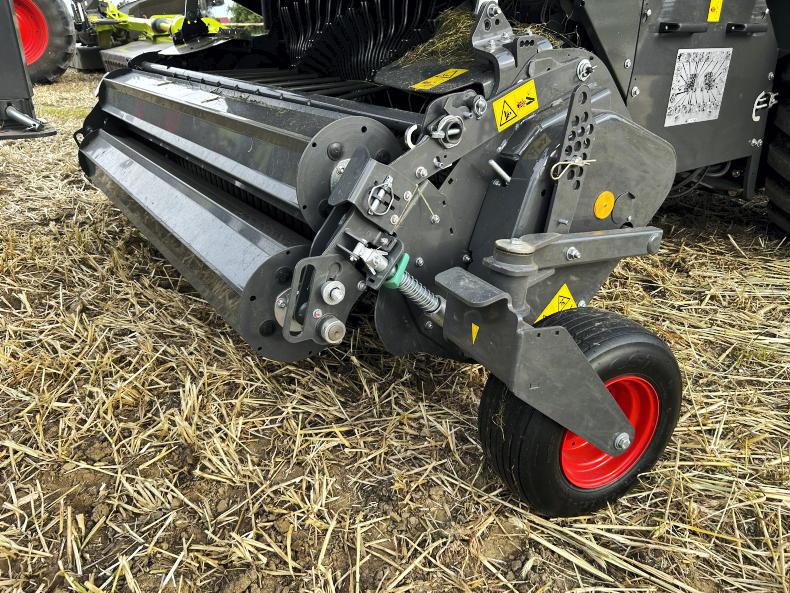
The 2.1m Multiflow pickup is available with four or five cam-controlled tine bars.
The dual bank allows knives to be engaged in groups of 25, 13, 12 or 0, all of which is done from the cab. The Pro cutting floor can be lowered up to 30mm to allow blockages to pass through. An optional early warning system is available to alert the operator as to the pickups load capacity.
Strengthened design
The new Rollant 630 has went from four drive chains to three heavier duty chains and sprockets. Meanwhile, the chain lubrication systems oil container has been increased to 7.2l.
The central lubrication system has also been redesigned, with the option of a Plus central lube system now available which also supplies the complete wrapping table with grease.

Bale transfer to the wrapping unit has been reduced to six seconds.
The chassis has also been redesigned and now offers a 20% increase in strength for improved durability thanks to 20mm steel profiles.
Inside the 1.25m x 1.20m bale chamber are 16 ribbed steel rollers which now benefit from heavier 55mm drive shafts, enabling higher density bales. The rear tailgate mounting is also now more robust. The tipping cradle has been beefed up and now offers a faster transfer cycle than before.
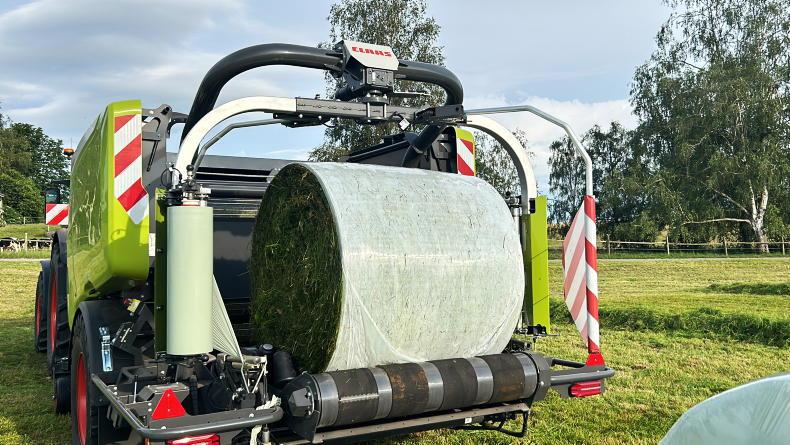
Claas claims it can wrap six layers of film with a 52% overlap in just 23 seconds.
Although believed to be standard UK and Irish spec, an option Claas continues to offer is its Maximum Pressure System Plus (MPS). A pivoting three-roller segment in the tailgate delivers extra pressure for more dense bales.
At the start of the cycle, these rollers pivot into the chamber to start the compaction cycle early on, causing the bale to rotate at a 90cm diameter. The MPS pressure setting can be adjusted from the cab.
Binding and Wrapping
As is standard on most modern machines, the option is there for net or film binding.
With a high-speed drive up to 36rpm and an improved hydraulic brake, the wrapping process too has been shortened. Claas claims it can wrap six layers of film with a 52% overlap in just 23 seconds. Pre-stretch in the two wrap film dispensers can be adjusted to 67 or 82%.
The Rollant 630 RC Uniwrap can be operated via the Cemis 700 terminal or via Isobus. Meanwhile, a Cemis 100 terminal is provided at the rear of the machine to operate wrapper related functions at ground level.
Claas presented its new Rollant 630 RC Uniwrap fixed chamber combination baler wrapper at a recent press event in Bad Saulgau in south Germany, home to the production of the brand's forage equipment and the largest grassland region within Germany.
Dubbed as a replacement for the current 400 series, the 630 benefits from a number of modifications throughout, resulting in improved performance.
Having put a pre series machine through its paces in the UK for some time now, Claas believes its latest offering will be a confident contender on the Irish and UK market.
The Rollant 630 is being offered with the new 2.1m Multiflow pick-up, available with either four or five cam-controlled tine bars.
A new cam track is said to reduce the overall power requirement by 20% while quick release plastic pickup bands improves maintenance.
The Roto Cut main rotor features 8mm double tines made from double-hardened boron steel.
Four rows of tines feed the crop into the chopping unit. The knife bank can accommodate up to 25 knives capable of a theoretical chop length of 44mm.

The 2.1m Multiflow pickup is available with four or five cam-controlled tine bars.
The dual bank allows knives to be engaged in groups of 25, 13, 12 or 0, all of which is done from the cab. The Pro cutting floor can be lowered up to 30mm to allow blockages to pass through. An optional early warning system is available to alert the operator as to the pickups load capacity.
Strengthened design
The new Rollant 630 has went from four drive chains to three heavier duty chains and sprockets. Meanwhile, the chain lubrication systems oil container has been increased to 7.2l.
The central lubrication system has also been redesigned, with the option of a Plus central lube system now available which also supplies the complete wrapping table with grease.

Bale transfer to the wrapping unit has been reduced to six seconds.
The chassis has also been redesigned and now offers a 20% increase in strength for improved durability thanks to 20mm steel profiles.
Inside the 1.25m x 1.20m bale chamber are 16 ribbed steel rollers which now benefit from heavier 55mm drive shafts, enabling higher density bales. The rear tailgate mounting is also now more robust. The tipping cradle has been beefed up and now offers a faster transfer cycle than before.

Claas claims it can wrap six layers of film with a 52% overlap in just 23 seconds.
Although believed to be standard UK and Irish spec, an option Claas continues to offer is its Maximum Pressure System Plus (MPS). A pivoting three-roller segment in the tailgate delivers extra pressure for more dense bales.
At the start of the cycle, these rollers pivot into the chamber to start the compaction cycle early on, causing the bale to rotate at a 90cm diameter. The MPS pressure setting can be adjusted from the cab.
Binding and Wrapping
As is standard on most modern machines, the option is there for net or film binding.
With a high-speed drive up to 36rpm and an improved hydraulic brake, the wrapping process too has been shortened. Claas claims it can wrap six layers of film with a 52% overlap in just 23 seconds. Pre-stretch in the two wrap film dispensers can be adjusted to 67 or 82%.
The Rollant 630 RC Uniwrap can be operated via the Cemis 700 terminal or via Isobus. Meanwhile, a Cemis 100 terminal is provided at the rear of the machine to operate wrapper related functions at ground level.







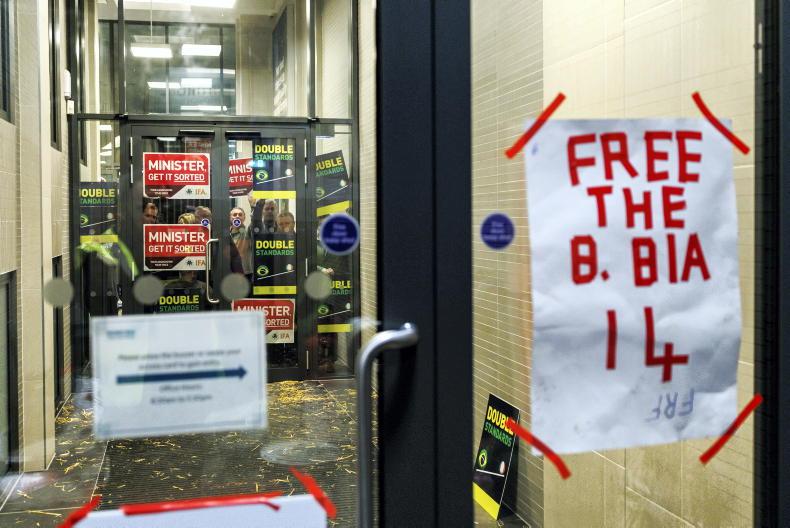

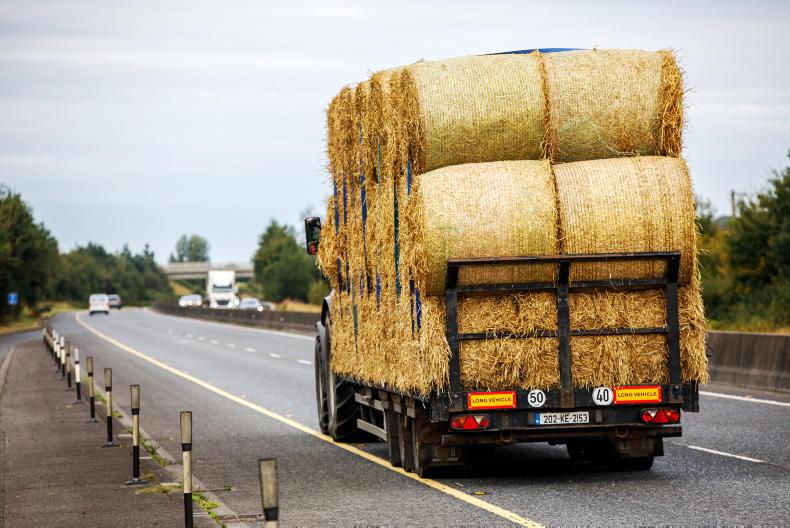
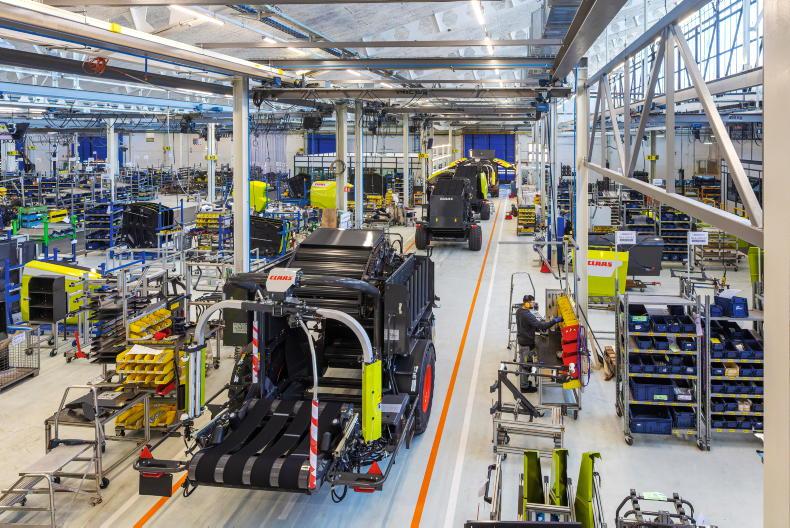
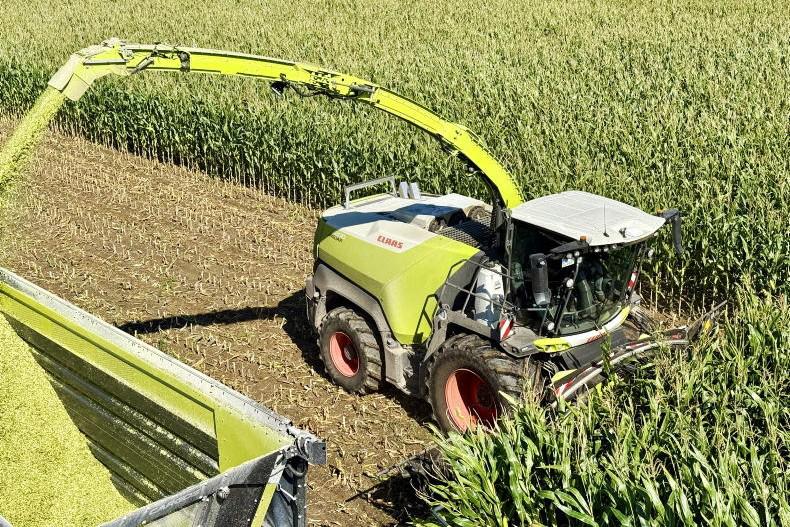
SHARING OPTIONS